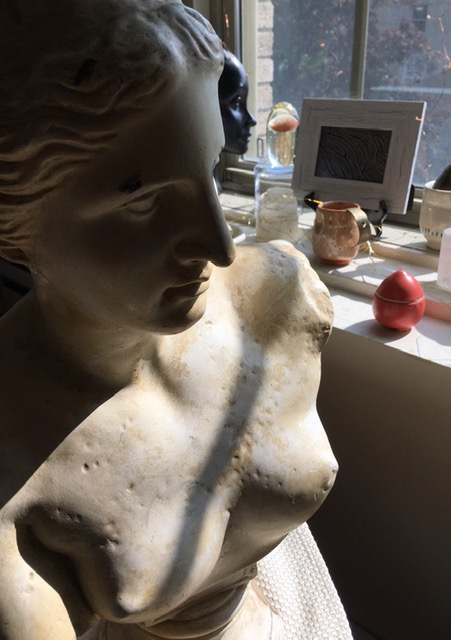Although most of what I’ve owned over the years has come from yard sales or attics, I no longer have a need, or if I’m honest, the desire to do the yard sale thing. Or so I thought. Now, most people would not call what I attended today a yard sale, but really it is. This one, however, came with a catalog, a preview day, a giant white tent, a battery-operated P.A. system, and more money than I have ever consciously seen spent in one place.
There was a circa-1870, burl-wood, bronze-gilded jewel box, five inches by nine inches, with a finely engraved floral motif set with raised round malachite medallions and lined with original purple silk in perfect condition—worth, thank you very much, $1,200. And there were grandfather clocks ($10,000) and Persian rugs ($7,000), cigarette cases ($2,600), candelabras ($15,000), and emerald and diamond bracelets ($5,000).
When, I wondered, would I ever have the opportunity to see a “virgin” (that’s what a friend tells me they’re called) Victorian mansion—unfussed with, still sporting the old fleur-de-lied wallpaper, claw-foot tubs, tin ceilings, and original molding, furnished with period “everything”? And only a few blocks from where I live.
Stories filtered through the air. Every room made me consider the people and their lives: Who lounged on the tufted, pink herringbone recamier? Who sipped from the Russian mixed metal, silver neillo goblet?
As each piece is held up by the next assistant and its merits described by the tanned, handsome auctioneer, I find myself walking through my own childhood rooms of mismatched furniture.
I am not here to buy, but to experience. And so I am busy experiencing—the people, the goods, the still summer-laden air, and the garden fragrance, mingled with the hotdog-vendor odor.
I continue in this reverie until the auctioneer holds up a bust. “Lot number 102,” the carrier announces. Her voice is light but strong, even without a microphone. The auctioneer adds, “A plaster bust depicting Aphrodite, about 1900. With a nice old patina.” Aphrodite was my grandmother’s name. I called her Nanny.

I’m not very close, because I wanted to watch the scene and chose to sit three-quarters of the way back. Although the bust is almost two feet high, I can’t see whether she’s chipped or anything, but I love her right away.
Few people want this bust. When the auctioneer lowers the asking bid, repeatedly, finally a few hands go up, and then, one. Just as he is about to let it go, my hand shoots up in the air with the numbered card I’d gotten just for the hell of it.
He shouts, “Sold to Number 16.” And it’s mine, for the lowest price of anything sold that day—well below its meager catalog estimate of $200.
Auctioneers, I’m sure, figure they’re bringing us history—”the finest, rarest ‘blah, blah, blah’ we have ever auctioned in my 35 years in the business”—but what they bring sometimes is indeed the rarest of the rare. How can they know that they are bringing someone their own piece of personal history? I had no plans to buy the plaster bust of Aphrodite. I had no plans to buy anything.
I just wanted to experience the auction and the people. And what I got was the smell of my nanny cooking cabbage in the projects, her head swathed in a silk kerchief, heavy gold earrings dangling from her stretched earlobes.
Published: original Bangor Metro, brainchild of Tori Britton & Mark Wellman
Discover more from Annaliese Jakimides
Subscribe to get the latest posts sent to your email.